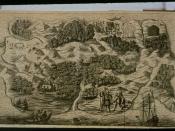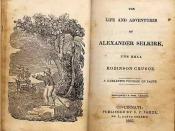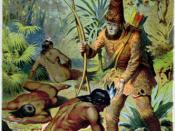Reader centred approach:
Daniel Defoe has been credited with writing the first long fiction novel in literary history; the highly acclaimed classic "Robinson Crusoe." It first appeared in print in 1719 and was very well received in its time. The story is that of the original 'cast away.'
The novel was explicitly religious, which was one of the very first things I came to take great notice of. He claims that the hand of god has controlled each situation which he has found himself in, however he turns only to religion when it is convenient, and as a means to justify his actions. Crusoe uses gods will as an acceptable reasoning for the unfortunate events which occur.
Before Crusoe was detained on the island, he had little to no belief in god. However, during his time on the island he 'finds' faith in god. It appears to me that Crusoe was only 'conveniently religious,' and his faith seemed to only be genuine for the durations of a problem or crisis.
Crusoe displays throughout the entire novel, a major sense of both class and race superiority. Towards the beginning of the novel, there are two characters; a 'European servant' and a 'Negro slave' as it is described, who are mentioned, and this is where we first are led to assume that one is better than the other.
When Friday is rescued by Crusoe, he is made into his 'servant', and Crusoe perceives him to be inferior and 'without the light of Providence.' Friday is informed to call Crusoe 'master' as he perceives himself to be his saviour and is therefore entitled to be called as such; and here he once again establishes himself as the superior.
Crusoe begins to see himself as a ruler and also displays possessive character...


